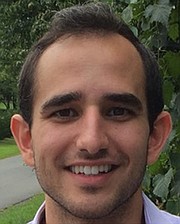Virginia State Senate Candidate Questionnaires
* = Incumbent
District 30
http://www.connecti…">Adam P. Ebbin* (D)
J. Ron Fisher (I), no response received
District 31
http://www.connecti…">Barbara A. Favola* (D)
http://www.connecti…">George V. Forakis (R)
District 32
http://www.connecti…">Janet D. Howell* (D)
District 33
Stephen B. Hollingshead (R), no response received
http://www.connecti…">Jennifer T. Wexton* (D)
District 34
http://www.connecti…">J.C. "Chap" Petersen* (D)
District 35
http://www.connecti…">Richard L. "Dick" Saslaw* (D)
http://www.connecti…">Terry W. Modglin (I)
District 36
http://www.connecti…">Gerald M. Foreman (R)
http://www.connecti…">Scott A. Surovell* (D)
District 37
http://www.connecti…">David M. Bergman (R)
http://www.connecti…">David W. Marsden* (D)
District 39
http://www.connecti…">George Lincoln Barker* (D)
http://www.connecti…">Joseph R. Murray (R)
Challenger, Senate District 31
Town of residence: Arlington
Age: 26
Education: University of Maryland; Robert H. Smith School of Business: B.S. Finance & Accounting
Occupation and relevant experience: Financial / National Security Consulting
Community involvement: Board of Directors – local environmental non-profit
Website: www.forakisforsenate.com
Email address: george@forakisforsenate.com
Twitter handle: @GeorgeForakis
Questions
What is one issue that defines your call to serve, why does it matter, and how will you tackle it?
Virginia, and more specifically Northern Virginia, faces the increasing challenge of providing a steady source of jobs that are not reliant on the federal government. This includes attracting both new and expanding businesses — in Northern Virginia, the evidence of this challenge is clear — vacant office space and a continued reliance on federal spending are issues that must be addressed as we move forward. This issue defines my call to serve the people of Virginia’s 31st district; for too long, our representatives have avoided tackling the difficult issues that affect a majority of our population. These economic challenges can be addressed with a variety of approaches, including lower taxes, decreased regulation, investment in infrastructure, and cultivating an overall business-friendly environment. The advantages of this approach are widespread and include lower individual taxes across all levels of income, and improved infrastructure, such as roads and communications systems, that will benefit everyone.
What distinguishes you from your opponent(s) and why should voters choose you?
I have not spent my professional career in an elected position, and as such, my commitments are simple and unwavering — I will make sure that the people of the Northern Virginia are represented the way that they want to be represented, not the way that special interests groups and politicians would like them to be. To the people of this district: I promise to listen to you (yes, all of you — regardless of whether you are in the heart of Arlington or the neighborhoods of Fairfax and Loudoun Counties).
Given the political makeup of the state legislature, what examples from your own experience suggests you can successfully bridge the intense partisan differences there?
The state legislature, much like Congress and the rest of Washington, faces challenges stemming from partisan differences and stubborn, self-serving agendas. While I hold true to many of my party’s values, I am not afraid to share my perspective as a member of the next generation of leaders. My issue agenda reflects a conservative approach with a willingness to consider an evolving landscape, both in our state and in our country. I am committed to representing the people of this district and am prepared to bring common-sense leadership to the legislature.
In order, list your top 5 specific legislative priorities.
- Creating jobs through economic development initiatives
- Reduce the tax burden on the middle class by cutting waste and prioritizing spending
- Improving infrastructure to alleviate traffic/congestion, allowing for a better quality of life and positive secondary economic effects
- Invest in all levels of education, including higher education and high-quality vocational programs for students who do not want to, or are unable to attend four-year programs.
- Alternative energy sources and clean nuclear power
How has your district changed in the last 10 years? What caused those changes?
Until “sequestration” in 2013, the population in this district (and Northern Virginia in general) was growing at an incredible rate. The federal budget cuts and subsequent slow in growth that occurred two years ago, however, illuminated that fact that we are too heavily reliant on D.C.’s fiscal policy and are in desperate need of our own economy. Indeed, we will always be home to defense contractors and IT professionals — but we must ensure that we create an environment that encourages all types of businesses to participate in the economy.
Will you support legislation restricting high interest lending including car title loans?
Yes. Part of our job as legislators is to protect the people that we represent and we are obligated to prevent businesses from taking advantage of Virginia families, even if it means putting common-sense limitations on the free market.
Will you support funding for Fostering Connections which would result in an influx of federal funding for foster children aging out of foster care?
Yes. Assistance to these families, especially considering that they may be considering/already enrolled in higher education at the time of aging out, is critical in shaping the futures of our foster children.
Do you support expansion of Medicaid under the Affordable Care Act, and if so, what would you do to make that happen?
Instead of Medicaid expansion, I support solutions that give Virginia citizens options and will work to support proactively-focused and less costly preventative care.
